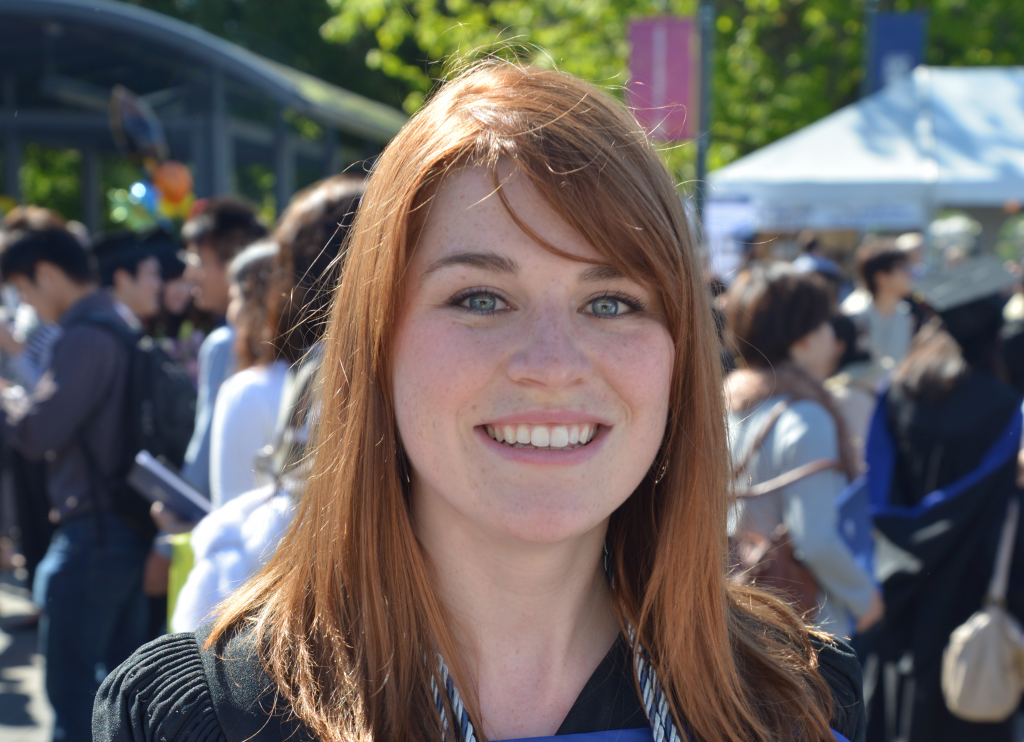When UBC Psychology alumna Jennifer Ferris talks about her research, her face becomes animated and her eyes cast that certain light of a person with a desire to discover. Ferris, an MSc candidate in UBC’s Graduate Program of Neuroscience, completed her undergraduate degree at UBC with Honours in Psychology. You’ll now find her performing research under the supervision of Dr. Lara Boyd, director of the Brain Behaviour Laboratory at UBC.
During her time as a psychology undergraduate student, Ferris left her mark on the department. She was named a Wesbrook Scholar, she received a Canadian Psychology Association Certificate of Excellence for best honours thesis, and she was recipient of a UBC Arts Undergraduate Research Award.
It was this award that led her on her path to discovery. With it she researched the distribution of Gonadotropin-Releasing Hormone in the rat hippocampus, under the supervision of Dr. Kiran Soma.
This research inspired her to explore neural systems and the brain.
“I started in the Bachelor of Arts program and originally was going to pursue clinical psychology,” says Ferris. “After studying the brain, I was hooked. I started to look at science in a new way.”
Ferris is lead author of a paper recently published in the Journal of Neuroendocrinology titled ‘Neuronal Gonadotropin Releasing Hormone and Astrocytic Gonadotropin Inhibitory Hormone Immunoreactivity in the Adult Rat Hippocampus’. Gonadotropin-releasing hormone (GnRH) and Gonadotropin-inhibitory hormone (GnIH) regulate the production of reproductive hormones, such as estrogen and testosterone, in the body.
Ferris set out to explore the possibility that GnRH and GnIH might control the production of reproductive hormones in the hippocampus, like they do in the body. The research team identified GnRH in the hippocampus, and that GnIH is produced in the hippocampus by non-neuronal cells called astrocytes, which are thought to support neuroplasticity.
This body of research is particularly important; some experts believe that the decline of reproductive hormones in old age may contribute to Alzheimer’s disease.
“This research is a first step to future studies that will start to unpack the exact function of these hormones in the hippocampus,” says Ferris. “A better understanding of the factors that control learning and memory in the healthy brain could ultimately lead to new treatment approaches for conditions like Alzheimer’s disease.”
Jennifer’s interest in neuroscience and brain injury led her to an interest in the contribution of Type-2 diabetes to stroke incidence and stroke recovery. Previous research suggests individuals with type-2 diabetes may have poorer recoveries after stroke. Jennifer’s thesis work will be the first to directly test the impact of diabetes on neuroplasticity after stroke using transcranial magnetic stimulation (TMS), a form of non-invasive brain stimulation.
The full circle
As an undergraduate student, Jennifer was actively engaged and an experiential learner. She expanded her student experience as a founding member of the leadership team of Psi Chi, UBC’s chapter of the International Honour Society in Psychology, later taking a term as president of the society. She was a founding editor for the UBC Undergraduate Journal of Psychology. She also led a Student Directed Seminar on Alzheimer’s disease, focusing on the neurobiological underpinnings and societal implications of the disorder.
Jennifer is still very connected to the department, TAing for Psyc 301 alongside Senior Psychology Instructor Dr. Michael Souza, whom provides mentorship on teaching, speaking, and leadership skills. She credits the research, teaching and educational experiences she had as an undergraduate for stimulating and inspiring her interest in pursuing graduate-level education.
She isn’t shy about delivering advice to current undergraduate students who are interested in pursuing science. “Never turn down an opportunity because you feel you don’t have the background and qualifications,“ says Ferris. “Push your boundaries and get out of your comfort zone. Your brain will take in so much more when you are challenged.”
When she’s not conducting her research at the Brain Behaviour Laboratory at UBC, she’s collaborating with a recent graduate of the American Film Institute on a series of entertaining YouTube videos, to make science fun and accessible. The series is called Sixty Second Science and can be watched at sixtysecondscience.org.
Her plans for the future include bringing a clinical training perspective to her research. She plans to enrol in the combined Master of Physical Therapy (MPT) program and PhD program in Rehabilitation Sciences, and she will continue investigating diabetes and stroke recovery during her PhD.
-Bonnie Vockeroth



